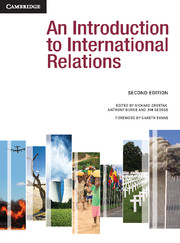Book contents
- Frontmatter
- Contents
- Tables, Figures and Boxes
- Contributors
- Preface and acknowledgements
- An Introduction to International Relations: The origins and changing agendas of a discipline
- 1 Theories of International Relations
- 1 International Relations Theory in an Age of Critical Diversity
- 2 Realism
- 3 Liberalism
- 4 Marxism and Critical Theory
- 5 Feminism
- 6 Postmodernism
- 7 Constructivism
- 8 Theories of Global Justice
- 2 The Traditional Agenda
- 3 The New Agenda
- Glossary of Terms
- Bibliography
- Index
- References
7 - Constructivism
from 1 - Theories of International Relations
- Frontmatter
- Contents
- Tables, Figures and Boxes
- Contributors
- Preface and acknowledgements
- An Introduction to International Relations: The origins and changing agendas of a discipline
- 1 Theories of International Relations
- 1 International Relations Theory in an Age of Critical Diversity
- 2 Realism
- 3 Liberalism
- 4 Marxism and Critical Theory
- 5 Feminism
- 6 Postmodernism
- 7 Constructivism
- 8 Theories of Global Justice
- 2 The Traditional Agenda
- 3 The New Agenda
- Glossary of Terms
- Bibliography
- Index
- References
Summary
Introduction
This chapter presents a constructivist understanding of world politics. We begin with a discussion of state identity, a fundamental concept of constructivism, and explore the way that identity defines and bounds state actions. To illustrate this concept, we address a number of issues central to the study of world politics: change, governance, and security. Overall, our goal is to present a thickly textured, layered understanding of the international realm based on a notion taken for granted in much of IR theory, meaning.
Constructivism is the newest but perhaps the most dynamic of the main theories of international relations. The seminal works inaugurating the constructivist approach to the study of global politics – articles by Alexander Wendt (1987; 1992) and books by Nicholas Onuf (1989) and Friedrich Kratochwil (1989) – are only about two and a half decades old, even though the intellectual traditions on which they draw have long histories in other academic fields. Unlike liberalism and realism (see Chapters 2 and 3), which have taken their bearings from developments in economic and political theory, constructivism, like Critical Theory (see Chapter 4), is rooted in insights from social theory (e.g. P. Berger and Luckmann 1967; Giddens 1984) and the philosophy of knowledge (Searle 1995; Hacking 1999; Golinski 2005). Perhaps in consequence, constructivism does not predict events, or offer definitive advice on how a state should act in the international arena. Instead, constructivism is best understood as a set of wagers about the way that social life is put together, wagers that centrally revolve around the fundamental importance of meaning to social action: ‘people act toward objects, including each other, on the basis of the meanings those objects have for them’ (Wendt 1999: 140). Constructivist IR theory is an application of that basic analytical commitment to the study of global politics.
Information
- Type
- Chapter
- Information
- An Introduction to International Relations , pp. 103 - 118Publisher: Cambridge University PressPrint publication year: 2011
